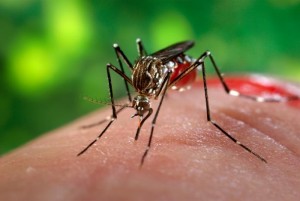The Puerto Rico Department of Health (Departamento de Salud de Puerto Rico) reported Wednesday (computer translated) that in epidemiological week 31, they reported 285, 284 suspected and 1 confirmed, additional cases of the mosquito borne virus, chikungunya.

This brings the islands total to 5,286 suspected and confirmed cases. All but 19 of the cases are considered locally acquired, or autochthonous transmitted.
In addition, health officials are investigating two fatalities suspected of being due to the viral disease. According to a Fox News Latino report today, Health Department epidemiologist Dr. Brenda Rivera Garcia said there were performing tests to determine if the two deaths, both adults between the ages of 20 and 59, were positive for chikungunya.
If they turn out positive, they would be the first chikungunya-associated deaths in Puerto Rico.
Since the first locally acquired chikungunya cases were reported in the Western hemisphere in December 2013, some 585,000 cases have been reported in the Americas. Local transmission had been identified in 31 countries or territories in the Caribbean, Central America, South America, or North America.
According to the Pan American Health Organization (PAHO), as of Aug. 22, there has been 37 chikungunya related fatalities in North, Central and South America and the Caribbean.
Chikungunya is characterized by an abrupt onset of fever frequently accompanied by joint pain, other symptoms or pain during chronic phase can include fatigue and depression. In addition, it includes muscle pain, headache, nausea, and rash.
Most patients recover fully, but in some cases the joint pain may be chronic. Serious complications are not common, but in older people, children and pregnant women the disease can get worse.
The virus is transmitted by the bites of infected Aedes aegypti and Aedes albopictus mosquitos, both present in the Americas. After the bite of an infected mosquito, onset of illness occurs usually between 3 and 7 days but can range from 2 to 12 days.
Chikungunya must be distinguished from dengue. While both diseases patients may have diffuse body pain, having Chikungunya the pain is much more intense and localized in the joints and tendons than dengue.
There are no specific drugs to cure the disease. Treatment is directed primarily at relieving the symptoms, including the joint pain. There is no commercial Chikungunya vaccine.

